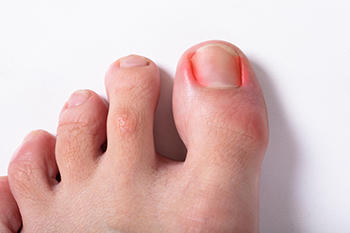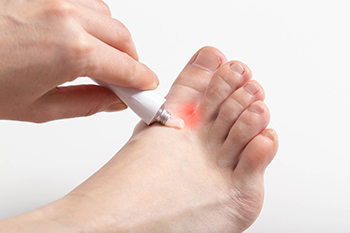NJ (908) 688-5577
NY (212) 737-2528
When your feet hurt, it is not easy to to do any form of exercise. However, it is thought that being active can actually help to reduce pain in the long run. If putting weight on your feet for any period of time is simply too painful, taking to the water might help. Exercising in a pool eliminates the pressure on your feet while allowing you to move other parts of the body. Applying ice to the sore areas of your feet is another way to reduce the pain. Taking non-steroidal anti-inflammatory medication, available over the counter, can also help. Devices such as canes, walking sticks, or walkers can absorb some of the weight placed on your feet when you stand or walk. Also, check that your footwear is comfortable, roomy, cushioned and supportive. Another key contributor to foot pain is being overweight, so the combination of a healthier diet and added exercise will likely be beneficial. If your pain increases or becomes unbearable, it’s a good idea to consult a podiatrist for a complete examination and diagnosis, as well as other treatment options.
Foot Pain
Foot pain can be extremely painful and debilitating. If you have a foot pain, consult with Glenn Davison, DPM from Advanced Podiatry. Our doctor will assess your condition and provide you with quality foot and ankle treatment.
Causes
Foot pain is a very broad condition that could be caused by one or more ailments. The most common include:
Diagnosis
To figure out the cause of foot pain, podiatrists utilize several different methods. This can range from simple visual inspections and sensation tests to X-rays and MRI scans. Prior medical history, family medical history, and any recent physical traumatic events will all be taken into consideration for a proper diagnosis.
Treatment
Treatment depends upon the cause of the foot pain. Whether it is resting, staying off the foot, or having surgery; podiatrists have a number of treatment options available for foot pain.
If you have any questions, please feel free to contact our offices located in Union, NJ and New York . We offer the newest diagnostic and treatment technologies for all your foot care needs.
 When the toenail becomes curved and grows into the skin along the sides of the nail, it forms an ingrown toenail. This can result in pain, inflammation, redness, swelling, and in some cases an infection. Issues such as genetics, improperly trimmed toenails, sweaty feet, and shoes that are too tight can all lead to ingrown toenails. In fact, athletes are particularly prone to ingrown toenails because they sweat more often. While ingrown toenails are usually not very serious, if left untreated, they can get very painful and may even get infected. Patients with ingrown toenails who have diabetes or a compromised immune system, have persistent pain, or believe that the nail is infected should consult with a podiatrist for treating the nail.
When the toenail becomes curved and grows into the skin along the sides of the nail, it forms an ingrown toenail. This can result in pain, inflammation, redness, swelling, and in some cases an infection. Issues such as genetics, improperly trimmed toenails, sweaty feet, and shoes that are too tight can all lead to ingrown toenails. In fact, athletes are particularly prone to ingrown toenails because they sweat more often. While ingrown toenails are usually not very serious, if left untreated, they can get very painful and may even get infected. Patients with ingrown toenails who have diabetes or a compromised immune system, have persistent pain, or believe that the nail is infected should consult with a podiatrist for treating the nail.
Ingrown toenails may initially present themselves as a minor discomfort, but they may progress into an infection in the skin without proper treatment. For more information about ingrown toenails, contact Glenn Davison, DPM of Advanced Podiatry. Our doctor can provide the care you need to keep you pain-free and on your feet.
Ingrown Toenails
Ingrown toenails are caused when the corner or side of a toenail grows into the soft flesh surrounding it. They often result in redness, swelling, pain, and in some cases, infection. This condition typically affects the big toe and may recur if it is not treated properly.
Causes
You are more likely to develop an ingrown toenail if you are obese, have diabetes, arthritis, or have any fungal infection in your nails. Additionally, people who have foot or toe deformities are at a higher risk of developing an ingrown toenail.
Symptoms
Some symptoms of ingrown toenails are redness, swelling, and pain. In rare cases, there may be a yellowish drainage coming from the nail.
Treatment
Ignoring an ingrown toenail can have serious complications. Infections of the nail border can progress to a deeper soft-tissue infection, which can then turn into a bone infection. You should always speak with your podiatrist if you suspect you have an ingrown toenail, especially if you have diabetes or poor circulation.
If you have any questions, please feel free to contact our offices located in Union, NJ and New York . We offer the newest diagnostic and treatment technologies for all your foot care needs.
 Diabetes is a systemic condition that can affect many parts of your body – including the feet. Due to the chronically raised blood sugar levels associated with diabetes, the nerves and blood vessels that supply the lower limbs can become damaged. This can cause neuropathy and poor circulation, both of which can lead to strange sensations, such as burning and tingling or numbness in the feet, a loss of sensation, and the formation of poorly healing foot wounds. The skin and nails on the feet may also change. Skin can become dry and cracked, and start to peel, and calluses may form more quickly, as well. Because diabetes can also cause immune insufficiency, foot and nail infections are more likely to occur. If you have diabetes, it is suggested that you visit a podiatrist regularly to monitor and preserve the health of your feet.
Diabetes is a systemic condition that can affect many parts of your body – including the feet. Due to the chronically raised blood sugar levels associated with diabetes, the nerves and blood vessels that supply the lower limbs can become damaged. This can cause neuropathy and poor circulation, both of which can lead to strange sensations, such as burning and tingling or numbness in the feet, a loss of sensation, and the formation of poorly healing foot wounds. The skin and nails on the feet may also change. Skin can become dry and cracked, and start to peel, and calluses may form more quickly, as well. Because diabetes can also cause immune insufficiency, foot and nail infections are more likely to occur. If you have diabetes, it is suggested that you visit a podiatrist regularly to monitor and preserve the health of your feet.
Diabetic foot care is important in preventing foot ailments such as ulcers. If you are suffering from diabetes or have any other concerns about your feet, contact Glenn Davison, DPM from Advanced Podiatry. Our doctor can provide the care you need to keep you pain-free and on your feet.
Diabetic Foot Care
Diabetes affects millions of people every year. The condition can damage blood vessels in many parts of the body, especially the feet. Because of this, taking care of your feet is essential if you have diabetes, and having a podiatrist help monitor your foot health is highly recommended.
The Importance of Caring for Your Feet
Patients with diabetes should have their doctor monitor their blood levels, as blood sugar levels play such a huge role in diabetic care. Monitoring these levels on a regular basis is highly advised.
It is always best to inform your healthcare professional of any concerns you may have regarding your feet, especially for diabetic patients. Early treatment and routine foot examinations are keys to maintaining proper health, especially because severe complications can arise if proper treatment is not applied.
If you have any questions please feel free to contact our offices located in Union, NJ and New York . We offer the newest diagnostic and treatment technologies for all your foot and ankle needs.
 Tinea Pedis, more commonly known as athlete’s foot, is a fungal infection that affects the feet and toes. The fungi that cause athlete’s foot thrive in warm and moist environments. The condition is very contagious and often spreads in areas such as communal locker rooms, pools, showers, and even sweaty footwear. Common signs of athlete’s foot include scaling, redness, itchiness, and in severe cases, fissuring (or deep cracking) of the skin. Since athlete’s foot can spread easily, patients who believe they have this condition would be wise to consult with a podiatrist for a proper diagnosis and treatment plan. The infection will likely need to be treated with antifungal medications, and measures may need to be implemented to keep the feet clean and dry.
Tinea Pedis, more commonly known as athlete’s foot, is a fungal infection that affects the feet and toes. The fungi that cause athlete’s foot thrive in warm and moist environments. The condition is very contagious and often spreads in areas such as communal locker rooms, pools, showers, and even sweaty footwear. Common signs of athlete’s foot include scaling, redness, itchiness, and in severe cases, fissuring (or deep cracking) of the skin. Since athlete’s foot can spread easily, patients who believe they have this condition would be wise to consult with a podiatrist for a proper diagnosis and treatment plan. The infection will likely need to be treated with antifungal medications, and measures may need to be implemented to keep the feet clean and dry.
Athlete’s foot is an inconvenient condition that can be easily reduced with the proper treatment. If you have any concerns about your feet and ankles, contact Glenn Davison, DPM from Advanced Podiatry. Our doctor will treat your foot and ankle needs.
Athlete’s Foot: The Sole Story
Athlete's foot, also known as tinea pedis, can be an extremely contagious foot infection. It is commonly contracted in public changing areas and bathrooms, dormitory style living quarters, around locker rooms and public swimming pools, or anywhere your feet often come into contact with other people.
Solutions to Combat Athlete’s Foot
Athlete’s foot can cause many irritating symptoms such as dry and flaking skin, itching, and redness. Some more severe symptoms can include bleeding and cracked skin, intense itching and burning, and even pain when walking. In the worst cases, Athlete’s foot can cause blistering as well. Speak to your podiatrist for a better understanding of the different causes of Athlete’s foot, as well as help in determining which treatment options are best for you.
If you have any questions please feel free to contact our offices located in Union, NJ and New York . We offer the newest diagnostic and treatment technologies for all your foot and ankle needs.